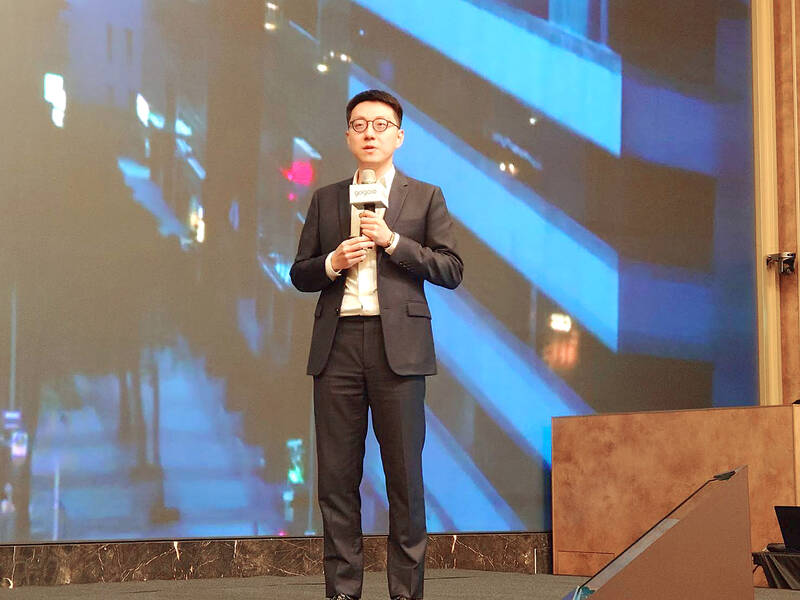Gogoro Inc (睿能創意), an electric scooter and battery network supplier, yesterday said it has signed an agreement with Castrol Holdings to form a joint venture, aimed at making inroads into the Vietnamese electric scooter market, leveraging the British oil company’s local market knowledge.
The joint venture is an essential part of Gogoro’s turnaround efforts by streamlining its overseas expansions and product portfolio, acting chief executive officer Henry Chiang (姜家煒) told an annual media gathering in Taipei.
Gogoro’s goal is to reach a break-even point for its battery business next year and turn a profit in 2028 on a consolidated basis, he said.

Photo: CNA
For the full year last year, Gogoro reported a wider net loss of US$123.2 million, compared with a net loss of US$76 million in 2023.
Regarding its electric scooter business, Gogoro plans to reduce its product lines to five and optimize its platform to shorten development cycles in response to customers’ purchasing behaviors, he said.
On the overseas expansion, Gogoro is making a strategic shift to concentrate its resources on one overseas market at a time, Chiang said.
In addition, Gogoro would team up with local partners to build a foothold, he said, adding that Castrol is a suitable candidate as it has built a strong presence in Vietnam.
That is a major shift in the company’s overseas expansion strategy as Gogoro has been ambitiously trying to create the whole supply chain overseas, aiming to duplicate its domestic success, Gogoro said.
“We now want to play a key role. We do not have to be all-around,” Chiang said.
Under the agreement with Castrol, Gogoro would be responsible for the development of electric scooters and providing battery solutions, while Castrol would handle major business decisions and operation of the joint venture, he said.
The Vietnam project is just the first step, he said, adding that 3 million two-wheelers are sold in Vietnam yearly.
The company is eyeing the massive Southeastern Asia market, which is forecast to grow at an annual rate of 30 percent from this year to 2030, Chiang said, citing a McKinsey & Co forecast.
“Southeastern Asia is a market Gogoro cannot miss out on,” he said. “The electric-vehicle market is taking shape there.”

Taiwan will prioritize the development of silicon photonics by taking advantage of its strength in the semiconductor industry to build another shield to protect the local economy, National Development Council (NDC) Minister Paul Liu (劉鏡清) said yesterday. Speaking at a meeting of the legislature’s Economics Committee, Liu said Taiwan already has the artificial intelligence (AI) industry as a shield, after the semiconductor industry, to safeguard the country, and is looking at new unique fields to build more economic shields. While Taiwan will further strengthen its existing shields, over the longer term, the country is determined to focus on such potential segments as

UNCERTAINTY: Innolux activated a stringent supply chain management mechanism, as it did during the COVID-19 pandemic, to ensure optimal inventory levels for customers Flat-panel display makers AUO Corp (友達) and Innolux Corp (群創) yesterday said that about 12 to 20 percent of their display business is at risk of potential US tariffs and that they would relocate production or shipment destinations to mitigate the levies’ effects. US tariffs would have a direct impact of US$200 million on AUO’s revenue, company chairman Paul Peng (彭雙浪) told reporters on the sidelines of the Touch Taiwan trade show in Taipei yesterday. That would make up about 12 percent of the company’s overall revenue. To cope with the tariff uncertainty, AUO plans to allocate its production to manufacturing facilities in

COLLABORATION: Given Taiwan’s key position in global supply chains, the US firm is discussing strategies with local partners and clients to deal with global uncertainties Advanced Micro Devices Inc (AMD) yesterday said it is meeting with local ecosystem partners, including Taiwan Semiconductor Manufacturing Co (TSMC, 台積電), to discuss strategies, including long-term manufacturing, to navigate uncertainties such as US tariffs, as Taiwan occupies an important position in global supply chains. AMD chief executive officer Lisa Su (蘇姿丰) told reporters that Taiwan is an important part of the chip designer’s ecosystem and she is discussing with partners and customers in Taiwan to forge strong collaborations on different areas during this critical period. AMD has just become the first artificial-intelligence (AI) server chip customer of TSMC to utilize its advanced

Chizuko Kimura has become the first female sushi chef in the world to win a Michelin star, fulfilling a promise she made to her dying husband to continue his legacy. The 54-year-old Japanese chef regained the Michelin star her late husband, Shunei Kimura, won three years ago for their Sushi Shunei restaurant in Paris. For Shunei Kimura, the star was a dream come true. However, the joy was short-lived. He died from cancer just three months later in June 2022. He was 65. The following year, the restaurant in the heart of Montmartre lost its star rating. Chizuko Kimura insisted that the new star is still down